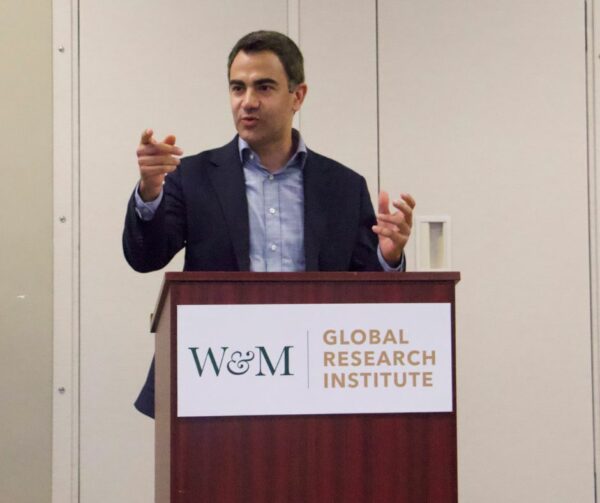It’s Time To Talk About World War III: GRI Sits down with Stephen Wertheim
Ahead of Stephen Wertheim’s public talk at William & Mary — hosted by GRI’s Security & Foreign Policy Initiative — the Institute’s Communications Assistant Adriana Shi ’24 had the chance to sit down with the leading historian. Their conversation unveiled how lessons from the past can inform today’s security challenges and policy debates. Responses have been trimmed for clarity.

As the U.S. has gone unchallenged in many people’s recent memory, Americans have lost touch with lived experiences from World War II and the Cold War, Wertheim explained during his visit to Williamsburg.
Question: In your evaluation, the United States is running a risk of war with China, Russia, and potentially both countries. Talk of World War III was largely sparked by Russia’s invasion of Ukraine last year. Since then, do you think that new threats or developments have made a world war a more likely outcome than it was in the early stages of the invasion?
Stephen Wertheim: The level of risk of a direct conflict between major powers is probably about what it was early on in the war in Ukraine. That said, U.S.-China competition has intensified even beyond what it was prior to Russia’s full-scale invasion of Ukraine. Mutual mistrust has deepened in Beijing and Washington. And since February 2022, U.S. and NATO support for Ukraine has gotten progressively more robust, while Ukraine has demonstrated an ability to launch successive offensives to reclaim territory. As a result, we may be somewhat closer today to a dramatic Ukrainian success, such as a drive into Crimea or all the way across eastern Ukraine, that might prompt Russian President Vladimir Putin to employ nuclear weapons and trigger a wider war, although the odds of such a major Ukrainian advance still seem long.
So it’s possible that we’re a bit closer, now, to a military conflict between the United States and either China or Russia than we were in February 2022. I don’t go to bed at night worried about whether the United States will be at war with Russia or China tomorrow. But I think it’s enough of a risk in the medium to long term that we should be worried now. The prospect of a great-power conflict has vaulted to the top of our foreign policy conversation, and for good reason.
Question: To what extent is the war in Ukraine impacting the United States’ rising tensions with China?
Wertheim: U.S. support for Ukraine and China’s support for Russia have hardened animosity in both Washington and Beijing. In particular, the war in Ukraine has transformed the status of Taiwan in the American imagination. It has made Americans much more concerned that Taiwan could be invaded by China, just as Ukraine was invaded by Russia. The previously almost unimaginable specter of large-scale military aggression has now morphed into something that ordinary people can readily imagine.
Against this backdrop have been a series of confrontations over Taiwan. If you look back to the beginning of the shift toward an adversarial U.S. approach to China under the Trump administration, Taiwan was not at the center of Washington’s complaints about China’s behavior or fears about what China could do. The main concerns were economic in nature, and in the security realm the most specific problem was China’s military expansion in the South China Sea. Over the past three years, the Taiwan issue has become vastly more politicized, vaulting perhaps to the center of the U.S.-China relationship.
Question: You’ve expressed concern that the United States is overextending itself, to the point where Europe feels little pressure to undertake efforts to defend on its own continent. What do you think needs to change here? How could a new dynamic of collaboration take hold?
Wertheim: Given America’s struggles to deliver for citizens at home, given the need to devote greater resources to Asia, we have to ask: Does it really make sense for the United States to bear the overwhelming burden of defending Europe, when wealthy and democratic European states have the resources to provide for their security and are now awakening to their own responsibilities in the face of Russia’s aggression in Ukraine? Both sides of the transatlantic alliance would benefit from undertaking a transition, over the course of a decade, to European leadership of European defense. The United States can remain a significant member of NATO, but it would be awfully risky for Europeans to depend upon Washington to come to the rescue in the event of Russian aggression against a NATO or EU member state.
This is an overdue change — and it is better to make the change gradually and responsibly than to wake up one day and find the United States having to leave its European allies in the lurch because it needs to fight a war in Asia. The U.S. military lacks the capability to fight a high-intensity conflict in Asia and Europe at the same time. The Pentagon had planned to fight two regional wars throughout most of the post-Cold War period. That two-war standard has now been abandoned, precisely because the kinds of adversaries the United States might face going forward are vastly more capable than the small powers, like Iraq and North Korea, that U.S. forces had been sized and structured to confront in earlier years.
Question: In a symposium organized by the think tank Defense Priorities, you argued that the United States “must relinquish some obligations” to be most effective. What are some obligations you believe the United States should give up?
Wertheim: The Middle East would be a great place to start. The United States, despite having terminated its war in Afghanistan, remains a Middle Eastern power. There are about 50,000 U.S. troops in the region today. For all the talk of pulling back from the Middle East, the number of U.S. troops stationed there today is pretty similar to what it was at the end of the Obama administration. Vital U.S. interests are not threatened very much by events in the Middle East, and no one state in the region is in any position to dominate its neighbors. Therefore the United States should adopt a more neutral role in the region, rather than partner with one set of unsavory actors against another set of unsavory actors. In many ways the argument in favor of this position has won the day, but policy has not changed.
In Europe, my view is not that the United States should formally abrogate treaty commitments, but that it should shift to a more offshore military posture and become more like a normal member of NATO (albeit with a large nuclear arsenal) than the dominant member of NATO. Article 5 of the North Atlantic Treaty, which governs NATO, doesn’t obligate the United States to take the lead in countering an attack on NATO territory. The United States could significantly reduce its military burdens if it were to promote a self-reliant Europe.
Question: How do you evaluate Biden’s foreign policy performance to date? Are there lessons you think the administration has learned and can implement to best preserve U.S. interests in this period of competition?
Wertheim: Coming into office, the Biden administration identified many of the right priorities — a foreign policy for the middle class, an end to forever wars, bold action on climate change. It pursued these aims in its first year, most notably by terminating the war in Afghanistan. But it drew an unfortunate lesson from the Afghanistan withdrawal, namely that pullbacks are politically risky and any restrained approach to foreign policy is best pursued in private, wrapped in the standard-issue language of U.S. global leadership. Then the war in Ukraine began, and despite the administration’s calibrated policies in Ukraine, it has sometimes used maximalist rhetoric, casting the war as a struggle for the rules-based order and democracy against autocracy. The administration has so far reinforced the preeminent U.S. role in European security rather than seizing the opportunity, while Russian forces are bogged down in Ukraine, to transition to European leadership of European defense.
With respect to China, the administration has consolidated the competitive approach that began under Trump, and pursued it in a more systematic way, in some ways for the better and in some ways worse. While it’s appropriate to put a priority on security in Asia over security in other regions, the administration has added to the tensions over Taiwan. In particular, the President has misstated U.S. policy four times, claiming that the United States has a legal obligation to defend Taiwan and would in fact defend Taiwan if attacked by China. The United States has no legal obligation to defend Taiwan; rather, the obligation is limited to helping equip Taiwan to defend itself. At one point, Biden also suggested that the issue of Taiwanese independence was up to the people of Taiwan to decide. That is an appealing moral principle, but it is not U.S. policy and does not produce positive consequences. U.S. policy is that the United States does not support Taiwan independence. The aim is to deter both Beijing from invading Taiwan and also Taipei from making unilateral moves toward independence that could provoke an invasion. That is the sound approach, and it has succeeded for decades. Thankfully Taiwan is not moving to declare independence, for now, but it’s also important to show Beijing that U.S. policy truly hasn’t changed and that the United States isn’t trying to force the Taiwan issue upon the Chinese. What will strengthen deterrence is giving Taiwan defensive weapons to make itself harder to invade. But it is dangerous to give Beijing reasons to wonder whether the United States will breach long-established understandings and creep up to well-known red lines.
Question: What strategy for U.S.-China relations do you see as the most balanced path forward, one that could prevent great-power war? Is it possible for the United States to stand firm on calling out blatant human rights abuses while also accepting that some other aspects of Chinese power may run counter to U.S. objectives?
Wertheim: Unless the United States gets Taiwan policy right, there’s not much hope for avoiding conflict and achieving some degree of cooperation with Beijing. And nothing is more important than making the One China policy more credible. That starts by stopping its erosion: no more so-called gaffes by the president and no more new, high-level official contacts with Taiwanese leaders, such as former House Speaker Nancy Pelosi’s visit to Taipei. To fortify the One China policy, U.S. officials could consider declaring that “under no circumstances” would the United States support Taiwan independence, a statement that would go beyond the usual line that the United States “does not support” Taiwan independence.
More broadly, now that the United States has strengthened its competitive position vis-a-vis China, it should start making a determined effort to seek coexistence and to define the terms of coexistence with China. That will not be easy to do at this point, but it’s essential to try. Some say the United States and China are bound for war because the United States seeks to maintain primacy in the Asia-Pacific and China seeks to gain primacy for itself. But even now, we have a great deal of time and opportunity to test that proposition. The United States is not voluntarily leaving the region, and China is not on the verge of kicking it out. So let’s work toward new terms of coexistence that recognize the legitimate role of both countries as the leading powers in Asia.
As you suggest, elevating the human rights concerns would not be well received in Beijing. If there are realistic ways that the United States can cause China to improve its respect for human rights, then those policy tools deserve consideration. And the United States has every right to avoid complicity in China’s repressive practices by, for example, cutting off trade in goods made with forced labor. But let’s be honest: China is a powerful country that is unlikely to bow to U.S. human rights demands, which it often views as illegitimate attempts to meddle in its affairs and even to destabilize the Chinese state. There are too many examples from America’s own recent history of claiming to support humanitarian or human rights but taking actions that have ended up making human suffering greater and human existence worse: the war in Libya, the war in Iraq, many years of the war in Afghanistan, and so on.
Question: What do you see as the importance of strategic communication and other soft-power tools in a U.S. response to rising international tensions?
Wertheim: The United States needs to get better at persuasion. It’s not just a matter of soft-power tools. It’s also crucial to send the right messages, ones that genuinely appeal to the needs and desires of people around the world. To formulate those messages, policymakers in Washington have to understand how the rest of the world views the United States. Take the war in Ukraine. The United States and its partners have struggled to expand the coalition supporting Ukraine and punishing Russia. Europe and certain U.S. security partners in Asia are on board, but few others are. Over the past year, more states have shifted from a pro-Ukraine position to a neutral position than the reverse.
Now, there are many reasons why countries in the global south are staying neutral, but the United States has done itself and Ukraine no favors in the way it has framed the war. President Biden has often, especially in the early weeks and months of the war, declared that supporting Ukraine is about defending democracy against autocracy. Now, this rhetoric appeals to many Americans and many Europeans, but not to most people around the world or to their often non-democratic governments. They would be more receptive to the principle that Russia’s invasion has undermined the independence of a sovereign state and violated the UN Charter’s prohibitions on the use of force unless in self defense or authorized by the UN Security Council. That’s a principle that governments around the world have a genuine interest in supporting. By contrast, Biden’s framing implies that Ukraine would not deserve support if its form of government did not meet with Washington’s approval. Why should countries not already aligned with the United States sign on to that principle?
Question: One of GRI’s research labs, the Teaching, Research & International Policy Project, analyzes the relationship between international relations theory and practice. Just 6 percent of international relations scholars surveyed by the TRIP Project predicted that China would invade Taiwan within the next year. If China were to take this hopefully unlikely military action toward Taiwan, what U.S. response would you support?
Wertheim: I agree with the 94 percent who find an invasion unlikely. Should an invasion occur, several specific factors should influence how the United States responds. An “invasion” is not just one scenario, but several. First, would China strike large numbers of U.S. troops at the outset of the conflict, thus making U.S. retaliation inevitable, or would it take a more limited action that would give the United States more latitude to respond? Second, how would Taiwan react? If Taiwanese behaved like Ukrainians — surprised by the invasion, but willing to fight robustly and successfully — then the case for U.S. assistance or even direct intervention would get stronger. But Taiwan’s response is difficult to predict. Third, how much support would the United States have in the region for military action? The United States would need basing access in order to mount a major military operation. But it is uncertain how much access even U.S. allies and partners would grant. Their decision would partly depend on whether they saw China’s invasion as an act of pure aggression or blamed Taiwan or the United States for taking actions that predictably provoked Beijing.
For all those reasons, your question is a difficult one to answer in the abstract. That said, I think the burden is on those who would advocate for an all-out war against China. Keep in mind that even if China were to gain control over Taiwan—and it might well fail, weakening itself in the process—it would not have an easy time controlling other countries in the region. China would enhance its ability to project naval power, but other countries would bolster their defenses. As a last resort, Japan could acquire nuclear weapons, which it could do in a short period of time. The United States would remain highly secure on the other side of the Pacific. We have to weigh that kind of world against a world in which the United States and China went to war directly over Taiwan. Such a war would probably last many years. The economic losses would be severe, worse than the Great Recession. It’s by no means assured the United States would win such a conflict. Having launched the invasion, China would probably be willing to endure more pain to absorb Taiwan than the United States would bear in defending Taiwan. This in turn would give Beijing incentives to escalate, perhaps to the nuclear level, in an attempt to get Washington to back down.
Question: In a recent poll from Morning Consult’s U.S. Foreign Policy tracker, voters from across parties identified terrorism, immigration, cyberattacks, and drug trafficking as the greatest foreign policy concerns facing the United States. But scholars in a recent TRIP Project survey said global climate change, the rising power of China, U.S. domestic political instability, and the Russia-Ukraine war were the most pressing issues. What do you think explains the gap between the general public’s thinking and that of IR experts? Can this gap be bridged?
Wertheim: Those are fascinating results. Voters emphasized threats that have directly affected their lives or have recently become politicized. They didn’t seem to feel gravely threatened by foreign states. It’s been a very long time since American society has been greatly affected by a foreign policy decision, at least as most Americans perceive things. The war in Vietnam — 50 years ago — is arguably the last example. The vast majority of Americans alive today are unused to paying significant costs for foreign policy choices, and they are used to foreign policy choices seeming to be cost free, at least if you’re not a service member or one of their family or community members. That really makes it hard to know what the United States would actually do in the event of a confrontation with China over Taiwan. Would the political resolve and cohesion be there, especially as the conflict went on and imposed severe costs on Americans at home?
Question: You explain that the threat and severity of today’s great-power competition can be difficult for many to grasp, since the United States has gone largely unchallenged in many people’s recent memory. Just one percent of World War II veterans remain alive to tell their stories. How can Americans begin to envision what another world war might look like, and who should be leading that educational effort?
Wertheim: Policymakers have a role to play in educating the public about the choices we face. It’s hard for them to do that because they tend to want to push policy in one direction or another. But even if you support a confrontational approach toward Russia and China, you really do have an interest in understanding how this country will behave if we get into a conflict. All Americans should seek to avoid the worst-case outcome — namely, of the United States fighting a major conflict and losing. Scholars, analysts, and commentators, people able to shape opinion, should talk more about these issues and have the debates that we need to have before we face a terrible crisis where there are no good options.
War games offer a useful way for people to appreciate what a conflict would entail. Meet the Press recently partnered with a think tank to dramatize a U.S.-China war game. We could also do peace games, examining which policy choices would make it more or less likely to get into a conflict.
I’m encouraged, even though we have a long way to go, by the widening public debate on foreign policy questions. It’s healthy that Americans don’t all think alike about, for example, the U.S. role in the war in Ukraine. Even if I might not like certain arguments that certain politicians are making, it is appropriate that lawmakers and citizens have real concerns about where the war in Ukraine is going, because the White House has not articulated a clear and realistic vision for how to bring this conflict to a close. I say this as somebody who supports the basic approach that the Biden administration has taken to date.
Question: Your book, Tomorrow the World: The Birth of U.S. Global Supremacy, encourages Americans to reexamine their own history so that we can embark on a path forward that involves fewer wars and a smaller U.S. military profile in the world. Can you explain the link between U.S. behavior in World War II and present-day policy challenges, such as Russia’s invasion of Ukraine and China’s global rise?
Wertheim: The United States has come to fetishize its political-military dominance of international affairs. Coming out of World War II, there was a specific rationale for why the United States should abandon its previous aversion to getting entangled in the affairs of Europe and Asia: namely, the United States needed to deter totalitarian great powers that had the capability to conquer much of Eurasia. In the face of totalitarian conquerors, the United States decided it should become a global superpower, forming alliances and stationing troops around the world.
After the Cold War ended, however, there were no more great powers left. Yet the United States still decided to pursue global military dominance. That meant that there were no longer any conceivable conditions, short of the Treasury running out of resources, that would cause American officials to say: “Okay, we’ve accomplished what we needed to accomplish, we can go home, and other countries can defend themselves. And if things go really, really wrong, we could always come back.” That kind of thinking became anathema. Instead, the United States became enamored of its own global primacy, as if maintaining primacy was equivalent to serving U.S. interests, regardless of domestic and international conditions. American primacy has become a forever project.
Today the United States is encountering mounting resistance to its ambitions, raising the costs and risks to Americans. I fear that we are headed toward overstretch and conflict. It would be better to make a strategic adjustment now that treats America’s global power position as a means to an end, not an end in itself. The United States should not only be comfortable with but should actively encourage responsible countries to manage their own affairs and solve global problems.




No comments.
Comments are currently closed. Comments are closed on all posts older than one year, and for those in our archive.